

Salesforce Commerce Cloud and Shopify compete in the e-commerce sector. Shopify is often preferred for its straightforward scalability, while Salesforce Commerce Cloud is favored by larger enterprises for its integration abilities.
Features: Salesforce Commerce Cloud offers integration with third-party systems, extensive support for mobile devices, and AI-driven personalization. Shopify provides an easy-to-use dashboard, strong SEO capabilities, and seamless hosting with built-in security features.
Room for Improvement: Salesforce Commerce Cloud could enhance its user interface to compete with Shopify's ease of use, simplify its initial setup process, and offer more competitive pricing for smaller businesses. Shopify could improve its customization options for larger enterprises, provide more advanced analytics, and enhance support for more complex e-commerce needs.
Ease of Deployment and Customer Service: Shopify allows for fast deployment with outstanding customer support suited for quick implementation. Salesforce Commerce Cloud, while more complex to deploy, provides comprehensive customer support and technical assistance tailored for detailed enterprise requirements.
Pricing and ROI: Salesforce Commerce Cloud involves higher setup costs, potentially yielding significant ROI for large-scale operations through its custom solutions. Shopify offers competitive pricing with lower initial costs, providing a clear path to ROI, especially suitable for smaller enterprises or straightforward business needs.
| Product | Market Share (%) |
|---|---|
| Salesforce Commerce Cloud | 5.8% |
| Shopify | 5.5% |
| Other | 88.7% |


| Company Size | Count |
|---|---|
| Small Business | 15 |
| Midsize Enterprise | 8 |
| Large Enterprise | 11 |
| Company Size | Count |
|---|---|
| Small Business | 9 |
| Midsize Enterprise | 1 |
| Large Enterprise | 2 |
Salesforce Commerce Cloud offers scalable and customizable eCommerce solutions ideal for consumer packaged goods and retail businesses, featuring robust CRM and order management capabilities.
Salesforce Commerce Cloud is a dynamic eCommerce platform known for its strong mobile support and seamless third-party integrations. It enables businesses to personalize user experiences and efficiently manage leads and opportunities. Despite facing challenges with integration and pricing for small businesses, its scalability and partner ecosystem make it highly adaptable for diverse needs.
What are Salesforce Commerce Cloud's key features?Salesforce Commerce Cloud is widely implemented in sectors like retail and consumer packaged goods for its CRM functionalities, customized order management, and automation capabilities. Businesses utilize it to create omnichannel platforms and tailored user experiences, especially benefitting financial, insurance, and banking services through its integrability.
Shopify is an easy to use, fast, and secure eCommerce platform. Its CMS platform comes with several dynamic and useful features to help users create and manage their websites. The solution’s high-end security features, insightful analytics, user-friendly interface, and vast range of third-party integrations makes it one of the top platforms in the market.
Shopify Features
Shopify has many valuable key features. Some of the most useful ones include:
Shopify Benefits
There are several benefits to implementing Shopify. Some of the biggest advantages the solution offers include:
Reviews from Real Users
Below are some reviews and helpful feedback written by PeerSpot users currently using the Shopify solution.
Badrilal P., Shopify Developer at Freelance, says, “Shopify can be used without any coding knowledge; just drag and drop and configuring, those are the basics. It's a great solution for people who are in the initial phase of their business. They can use it to easily set up a store that includes product info, product pricing, add to cart, payment methods, gateway integration, menus, contact us forms, and inquiry forms. Anyone can set those features up in one day using Shopify. That's a huge benefit for our customers.”
PeerSpot user Tushar K., Co-founder at Dotmagic Infotech/Shopify Expert at Dotmagic Infotech, mentions, “The most valuable features are the core structure and backend structure. Our clients are easily able to manage their sites at the backend. Shopify provides an easy to use service at the backend that includes product upload, customer service, team settings, and team customization. It is all very easy to handle.”
We monitor all eCommerce Platforms reviews to prevent fraudulent reviews and keep review quality high. We do not post reviews by company employees or direct competitors. We validate each review for authenticity via cross-reference with LinkedIn, and personal follow-up with the reviewer when necessary.